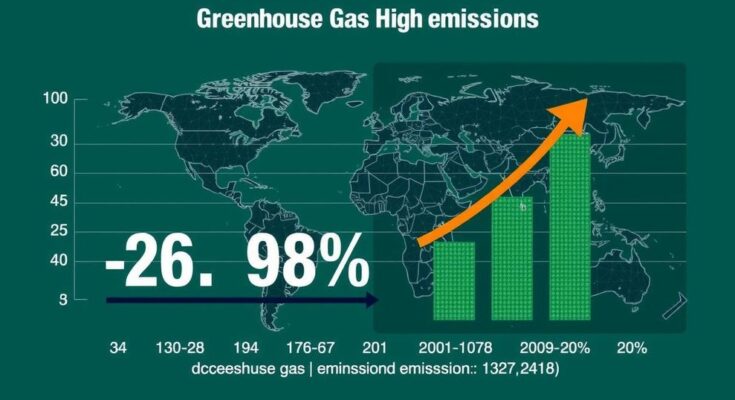India has achieved a 7.93% reduction in greenhouse gas emissions from 2019 to 2020, as reported in its 4th Biennial Update Report to the UNFCCC. The country has pledged to reach net-zero emissions by 2070, employing various initiatives across energy, urban planning, and environmental projects. Innovative measures, like tree planting campaigns, emphasize India’s commitment towards sustainable development and climate resilience.
India has demonstrated progress in its commitment to climate resilience, achieving a notable 7.93% reduction in greenhouse gas (GHG) emissions in 2020 relative to 2019. This achievement is documented in India’s 4th Biennial Update Report submitted to the United Nations Framework Convention on Climate Change (UNFCCC) on December 30, 2024. The reduction reflects India’s adherence to its pledge of reaching net-zero emissions by 2070, as established during the 26th Conference of the Parties (COP 26) in 2021.
The energy sector remains a significant contributor to emissions, accounting for approximately 75.66% of GHG emissions in 2020. India’s commitment towards low-carbon development is evident in measures such as the promotion of sustainable urban planning, adoption of clean air initiatives, and the enhancement of forest and vegetation cover. Furthermore, the country’s Long-Term Low Greenhouse Gas Emission Development Strategies (LT-LEDS) guide its transition towards a greener economy and climate change mitigation.
Additionally, India’s diverse geography necessitates the implementation of adaptation strategies to combat the adverse effects of climate change. Various initiatives like afforestation programs, urban adaptation planning, and air pollution control exemplify India’s comprehensive approach. With the growing importance of environmental stewardship, India is integrating these strategies into economic and developmental policies.
Moreover, the Miyawaki tree planting technique adopted during the Mahakumbh 2025 demonstrates India’s innovative measures to enhance green cover while reflecting its cultural values. The nation stands firmly on the path towards sustainable and responsible climate action, enhancing its resilience against climate challenges while fostering economic growth.
The increase in global temperatures and climate change pose significant threats worldwide, prompting the establishment of the United Nations Framework Convention on Climate Change (UNFCCC) in 1994. Countries are required to submit their Nationally Determined Contributions (NDCs) to comply with the Paris Agreement. In response, India vowed to achieve net-zero emissions by 2070 at the COP 26 conference held in 2021. The focus is on sustainable development grounded in equity and a commitment to reducing emissions while addressing developmental needs, particularly in light of India’s considerable population and growing economy.
In conclusion, India is making significant strides towards a sustainable, climate-resilient future, evident in its 7.93% reduction in GHG emissions and proactive steps in climate action. The efforts include innovative strategies such as the Long-Term Low Emission Development Strategy and extensive afforestation initiatives. These actions reflect India’s dedication to balancing economic growth with environmental integrity, ultimately working towards an ambitious goal of achieving carbon neutrality by 2070.
Original Source: pib.gov.in




